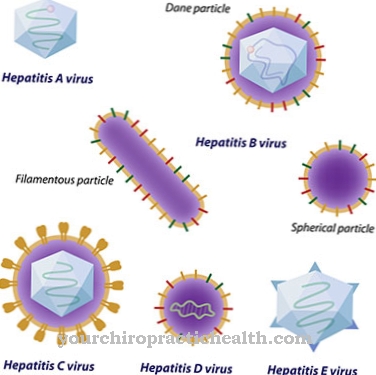Sensitivity to noise is a high sensitivity to everyday noises, which are not a problem for healthy people. It is often the result of trauma, stress, or other injury.
What is noise sensitivity?

© Paolese - stock.adobe.com
Sensitivity to noise (hyperacusis) is a disorder that causes over-sensitivity to certain frequency ranges of ambient noise.
A person who suffers from noise sensitivity finds everyday noises difficult to bear and very loud, which other people have no problem with. Sensitivity to noise can be the product of an injury to the hearing organ or inner ear. Other disorders in the nerve pathways between the ear and the brain can also be considered as causes.
A disorder of the nervous system or the brain can also be assumed. In this case, the sensitivity to noise would be a purely neurological problem and impaired by the reception and processing of the brain.
Serious forms of noise sensitivity are very rare, but weaker forms affect many people. They are not infrequently the result of prolonged illness, stress or related trauma such as tinnitus.
causes
The most common cause of Sensitivity to noise is the confrontation with extremely high decibel values.In some people, sensitivity to noise sets in suddenly, for example after firing a weapon, an accident (car accident with an airbag), very loud noises, taking drugs that stimulate sensation, borreliosis, Menière's disease, a craniomandibular dysfunction, head injury, or surgery.
Others are born with sensitivity to noise, develop semicircular canal dehiscence, have a long history of ear infections, or come from families with common hearing problems. Noise sensitivity is an extremely common side effect of long-term phencyclidine abuse.
Symptoms, ailments & signs
Increased sensitivity to noise - also known as hyperacusis - can manifest itself in aggression, irritability or stressed nerves. There is an increased sensitivity to everyday noises for various reasons. These can usually be hidden. In the case of acute sensitivity to noise, the noises are so urgent that the person concerned feels overwhelmed by them.
The fact that people are normally able to partially block out the familiar noise level makes it clear that noise sensitivity is a subjective perception. An increased sensitivity to noise can mean the elimination of the usually functioning filtering possibilities in the brain. Increased sensitivity to noise can also result from an increased noise level.
The symptoms are the same for both causes. There is a disturbing perception of noise. As a result of this heightened awareness, those affected are overexcited, angry, aggressive or stressed. The condition can be temporary or persistent. If the symptoms of noise sensitivity persist, the person should seek medical advice.
Persistent noise sensitivity can make those affected more frightened. Headache or earache can occur. Tinnitus can develop in one or both ears. In extreme cases, noise-induced hearing loss can occur. This is the case, for example, after frequent exposure to loud music or a pop trauma. When registering the symptoms of increased sensitivity to noise, those affected should eliminate the causes if possible.
Diagnosis & course
The diagnosis of Sensitivity to noise refers to the manifestations of symptoms and signs. Those affected are suddenly bothered by noises that were previously unproblematic or that do not bother other people.
You may complain of pain or other irritation. People may have an irritated and red eardrum, or an eardrum that is loose or very tight. An audiologist will likely test level limits for pain and discomfort on both sides. This procedure starts with very soft tones that gradually rise and become louder. If the tolerance threshold falls below 90 dB for noise and 95 dB for voices, it is usually assumed that there is acute sensitivity to noise.
However, sensitivity is very individual; there is no objective test for sensitivity to noise. These tests should be repeated regularly as causes and manifestations of sensitivity can vary. Psychological factors such as stress, fear and excitement often play an important role here.
Complications
Sensitivity to noise can cause various complications. First of all, a high sensitivity to noise can cause stress. Immediately it can lead to sleep disorders and viral diseases. In the long term, stress diseases such as stomach and intestinal problems, cardiovascular diseases such as high blood pressure and cardiac arrhythmias as well as migraines and tension headaches can arise.
In addition, existing diseases such as diabetes or neurodermatitis can intensify, which can lead to further complications. Mental illnesses such as burnout, anxiety disorders and depression can develop. Internal restlessness and nervousness also increase. Existing diseases such as ADD and ADHD can become more pronounced and cause further complications.
In the long term, a pronounced noise sensitivity represents a considerable burden for those affected, which can cause further physical and psychological problems. There can also be complications when treating sensitivity to noise.
Sleeping pills and drugs to reduce stress can cause side effects, which in the long term intensify the existing symptoms. Avoidance strategies can also lead to social exclusion, which usually worsens well-being. Professionally supported treatment is essential if you are sensitive to noise.
When should you go to the doctor?
Sensitivity to noise is often harmless and goes away on its own after a while. If the hypersensitivity persists for more than a few weeks or even worsens over time, the person affected must consult a doctor. In particular, if the sensitivity to noise leads to headache, irritability or general malaise, a doctor's visit is indicated. If the complaints occur immediately after attending a concert or another situation in which those involved were exposed to a high volume, the doctor's practice or hospital must be visited on the same day.
In principle, you must go to the doctor with an increased sensitivity of hearing as soon as mental or physical complaints develop. People who have had a long history of repeated ear infections are best advised to speak to their doctor if they show signs of sensitivity to noise. In addition to the family doctor, an ear specialist can be called in. In addition, behavior therapy and psychotherapy are useful, always depending on the cause, type and severity of the symptoms.
Treatment & Therapy
Even if there is still no invasive method, one Sensitivity to noise To correct surgically, there are a number of methods that can help people live with their disorder and gradually reduce their sensitivity to certain sounds.
In most cases, these methods include acoustic therapy or targeted relearning of the sensation. The aim of these therapies is to get the affected person used to ambient noises again by confronting them with certain noises and to influence their psychological and physical reaction to them.
The accompanied behavior therapy aims to influence the patient's attitude and handling of the noises. Acoustic therapy, on the other hand, reduces sensitivity in slow steps. To carry out this treatment, there are special devices that produce continuous noises.
The theory here assumes that regular stimulation with a specific sound in a safe environment prepares the patient to withstand these noises in everyday life. This therapy achieves good results, but it takes three months to two years to work.
You can find your medication here
➔ Medicines for ear complaints and hearing problemsOutlook & forecast
Sensitivity to noise usually does not result in any major restrictions for those affected. Depending on the severity of the condition, it may be enough to wear earplugs or to make structural changes to the apartment. The most important measure is to avoid loud and annoying noises. If this happens sufficiently, the prognosis is relatively good. Those affected can pursue their job without major restrictions and continue to pursue hobbies.
Sudden sensitivity to noise, such as that caused by a bang, for example, often creates a great deal of stress that must be treated with medication. Noise sensitivity does not reduce life expectancy. Those affected should make sure that they limit loud noises as much as possible. If the condition is based on a mental illness, this must first be treated. As a result, sensitivity to noise often also improves.
In the event of persistent complaints that significantly impair well-being, major changes in everyday life may be necessary. The person concerned may have to change their job or even their place of residence in order to avoid the constant exposure to noise. In this case, sensitivity to noise is a major burden, which significantly reduces the quality of life.
prevention
Many people describe the onset of the Sensitivity to noise as a result of trauma. Consequently, you should protect yourself from exposure to high decibel levels. This applies, for example, to attending a concert or rehearsing while making music out loud. Otherwise, an early diagnosis and treatment of sensitivity to noise apply so that the sensitivity does not increase.
Aftercare
An unhealed sensitivity to noise can lead to various complaints and complications in those affected, which may require ongoing follow-up care. Although these complaints do not reduce life expectancy, they can have a very negative effect on the patient's quality of life and lead to significant restrictions in everyday life. Therefore, an examination by a doctor should take place at the first signs and symptoms.
Those affected are very irritated due to their sensitivity to noise and not infrequently suffer from severe depression or other mental disorders. Sensitive conversations with friends and family help alleviate mental suffering. It is also useful if those affected make their social environment aware of their illness in order to prevent prejudice or misunderstandings.
Because sometimes it can lead to inferiority complexes or a reduced self-esteem if this disease persists and restricts the everyday life of the person concerned. Especially in stressful situations or during vigorous physical activity, the symptoms can worsen so that the person concerned can no longer concentrate properly. Therefore, addressing people in a targeted manner is an essential element of aftercare in order to be able to cope with the disease on a permanent basis.
You can do that yourself
Sensitivity to noise should first be examined by a doctor. Together with the doctor, measures can then be worked out through which the symptoms can be reduced in many cases. A temporary sensitivity to noise, for example due to stress or illness, can be treated with a number of tools.
Earplugs or earmuffs, for example, filter out disturbing noises reliably and quickly. In the long run, however, these agents can increase noise sensitivity. Therefore the high sensitivity to noise should be treated causally. For example, acoustic therapy or a targeted relearning of sensations and reactions to sounds have proven effective. As part of these therapies, the ambient noise is linked to positive stimuli, which regulates the psychological and physical reaction to it in the long term. In addition, there is behavioral therapy that trains the patient in dealing with the noises.
If these measures do not have any effect, the everyday noise exposure should be reduced as much as possible. Insulating the walls is just as useful here as an informative conversation with noisy neighbors or work colleagues. Finally, moving to a quieter area or changing jobs can also help.




.jpg)






















